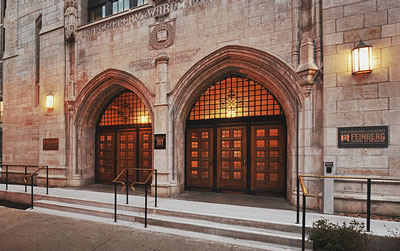-

Kalb Named Inaugural Les Turner ALS Research and Patient Center Director
Robert Kalb, MD, has been named to lead the Les Turner ALS Research and Patient Center at Northwestern Medicine, as the center’s inaugural director.
-

Incoming PhD Students Arrive on Campus
Feinberg recently welcomed dozens of new PhD students to campus, including students in the Driskill Graduate Program in the Life Sciences and the Northwestern University Interdepartmental Neuroscience Program.
-

Treating the Whole Person
Meet Jeffrey Linder, ’97 MD, MPH, Feinberg’s chief of General Internal Medicine and Geriatrics in the Department of Medicine.
-

Scientists Discover Novel Mechanism Underlying ALS and Related Dementia
A study has identified a new mechanism for how a gene mutation leads to the death of neurons in amyotrophic lateral sclerosis and a related form of dementia.
-

Advancing Discovery Through Cutting-Edge Genomic Technologies
Xinkun Wang, PhD, director of the NUSeq Core Facility, supports the research of scientists throughout the medical school with the latest genomic technologies, including next-generation sequencing.
-

Brain Rewiring in Parkinson’s Disease May Contribute to Abnormal Movement
A study published in Neuron suggests the brain’s own compensatory mechanisms contribute to the debilitating motor symptoms of Parkinson’s disease.
-

Pharmacogenomics for All
Northwestern Medicine investigators are on a mission to bring precision medicine to African-Americans.
-

Genomic Analysis Offers Insights into Cause of Wilms Tumor
A comprehensive genomic analysis of the most common kidney cancer in children – found genetic mutations involving two distinct processes, potentially providing new opportunities for future treatments.
-

Scientists Discover Key Cellular Mechanism Underlying Parkinson’s Disease
The major features of Parkinson’s disease have been linked to a toxic cascade beginning with oxidized dopamine, providing a possible therapeutic pathway.
-

Scientists Discover Mechanism Behind ‘Paused’ Genes
Northwestern Medicine research has explained the mechanism behind ‘pauses’ in transcription, which has implications for future cancer therapies.
-

New Leadership Named for Medical Scientist Training Program
Hossein Ardehali, MD, PhD, has been named the new director of Feinberg’s Medical Scientist Training Program; Melissa Brown, PhD, has been named associate director of advising and Xunrong Luo, MD, PhD, the associate director of admissions for the program.
-

Expanded Genetic Counseling Program Now Second-largest in the US
The Graduate Program in Genetic Counseling expanded from 14 to 20 students per class, preparing graduates for careers in various genetic counseling fields, including clinical, industry, research and public policy.
-

Going With the Ion Flow
Northwestern Medicine scientists are diving deep into the structure and function of ion channels to inform new therapies.
-

Trial Shows Drug Rapidly Reverses Blood Thinner’s Effects
The drug idarucizumab rapidly reversed the anticoagulant effects of the blood-thinner dabigatran in emergency situations, according to a recent phase III clinical trial.
-

Symposium Highlights Opportunities for Graduate Students and Postdoctoral Fellows
Graduate students and postdoctoral fellows in the biomedical field gathered for an all-day symposium dedicated to showcasing research and exploring career options.
-

Online Tool Predicts Heart Disease Events in Young Adults
An online calculator showed initial success at predicting the risk of heart disease events among young, healthy adults, according to a new study in JAMA Internal Medicine.
-

Medical Student Deepens Global Perspective With Internship in Cuba
Wenyuan Zhou, a second-year MD and MPH student, recently completed a summer internship in Havana, Cuba, where she learned about prevention in the Cuban healthcare system.
-

Novel RNA Discoveries Could Improve Stem Cell Research
A study has shown that a recently-discovered type of RNA is specific to certain cell types, which may make it possible to use those RNA sequences as a marker in stem cell research.
-

Making a Mark in Translational Medicine
Feinberg — and the University more broadly — is increasingly focused on ensuring that exciting discoveries made by basic scientists are also soon turned into treatments that impact human health.
-

Simon Honored for Contributions to Health Equity, Policy
Melissa Simon, MD, MPH, ’06 GME, the George H. Gardner Professor of Clinical Gynecology, will receive the 2017 Marion Spencer Fay Award in recognition of her contributions to women’s health, health equity and national health policy.





